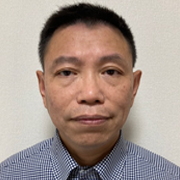
Dr. Chunfu Chen
Henkel Technology Center – Asia Pacific, Henkel Japan Ltd., Yokohama, Japan
Title: Latest Developments in Epoxy Adhesive Technology
Abstract:
Epoxy adhesive is one of the most widely used reactive adhesives, especially for critical structural bonding applications requiring high adhesion and reliability performance. Epoxy adhesives show good adhesion to a wide range of materials such as metals, glass, concrete, ceramics, wood, and many plastics. Curing shrinkage is very low. Cured epoxy resin possesses strong and rigid cross-linked chemical structures that are well-suited for various bonding applications. Epoxy adhesives usually need a relatively long cure time, ranging from several days at room temperature to at least tens of minutes at elevated temperature. Most cured epoxy adhesives are rigid and are not suitable for bonding flexible substrates. Considerable research and development efforts have been devoted to overcoming these limitations and significant progress has been achieved. With selection of suitable new types of latent curing agents, one-component thermal cure epoxy adhesives developed recently can be cured at much lower temperature conditions as compared to conventional DICY containing epoxy adhesives. UV cure cationic epoxy adhesives have been commercialized and successfully used in optical parts bonding, camera module sensor packaging and OLED panel assembly. UV and thermal dual cure epoxy adhesives combine well the advantage of instant curability of UV acrylate composition with high reliability performance of thermal cure epoxy part and has been successfully used in electronics assembly industry. Core shell rubber toughener containing epoxy adhesives are especially suitable for use in high-performance structural bonding adhesives. Sustainable biobased epoxy adhesive and halogen-free epoxy adhesive development has become increasingly important from global environmental protection expectation, government regulation restriction and customer requirements.
Biography:
Dr. Chunfu Chen is currently Senior Scientific Principal Epoxy of Henkel Adhesive Technologies, the world’s number one producer in adhesives, sealants, and functional coatings. He is responsible for new adhesive product development, new epoxy technology research, and providing technical advice as the leading expert to corporate internal teams and external partners especially related to epoxy adhesive technology. Dr. Chen is based at Henkel Technology Center – Asia Pacific, located in Yokohama, Japan.
He has abundant research experience, with over 35 years, in polymer science and material areas especially on epoxy adhesive technology. His technical expertise lies in the areas of new product development and new technology research, ranging from room temperature cure epoxy adhesives, heat cure epoxy adhesives, light cure epoxy adhesives, and light cure acrylic adhesives as well as latent curing agent for epoxy resin. Dr. Chen has contributed to very successful development on various new adhesive products for electronic assemblies such as camera module bonding, LCD ODF panel sealing, display module assembly, and touch panel LOCA. He has also contributed to successful development on many new adhesive products for general industry applications such as general manufacturing structural bonding, maintenance and repair protective coating.
D. Chen received his Bachelor of Science in Chemistry in 1985 and his Ph.D. in Polymer Chemistry in 1990 from Nankai University in Tianjin, China. After completing his Ph.D., he became Assistant Professor at Nankai University and had been a visiting researcher for 1 and half year from 1991 to 1993 at Sophia University in Tokyo, Japan. Dr. Chen has invented 37 patents with 22 granted already. He has also published more than 40 international conference, research, and review articles. Recently Dr. Chen has authored a new scientific book ‘Instant Bonding Epoxy Technology’, to be published soon by Bentham Science.